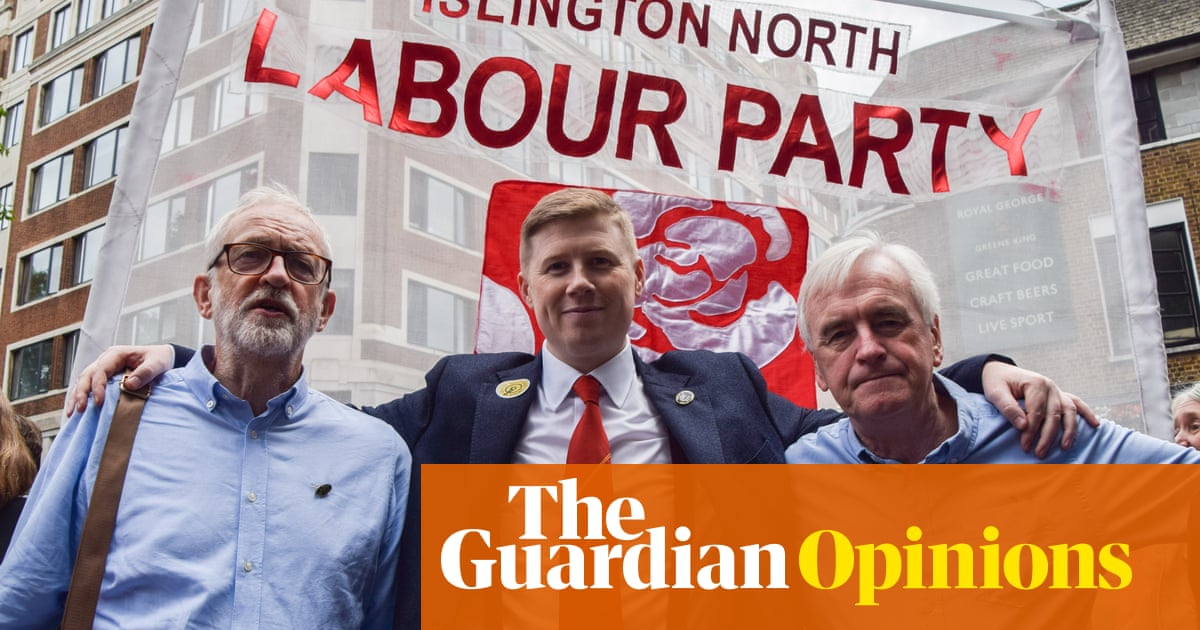
As Keir Starmer’s aides tuned into Boris Johnson’s South Tyneside speech to the CBI last Monday, on the alert for any policy details the Labour leader could use for his own speech later that day, they couldn’t believe their luck.
The Conservative government’s relationship with business was already scratchy, after two tax-raising budgets, the shelving of plans to overhaul the hated business rates system, and Johnson’s criticism of the haulage industry during the fuel crisis.
But any emollience the prime minister had hoped to show in his Tyneside speech was overshadowed by his bumbling delivery – including a lengthy digression about Peppa Pig.
Later that same day, quoting the CBI’s first annual report, from 1965, Starmer told business leaders, “the whole future of Britain rests upon the success of industry”.
Two years after Labour’s catastrophic defeat at the 2019 general election on a radical manifesto that included nationalisation of key utilities including rail, mail and broadband, Starmer and his frontbench colleagues are putting in the hard yards in the hope of convincing Britain’s businesses they are on their side.
Jeremy Corbyn’s shadow chancellor, John McDonnell, did carry out a “tea offensive” among business leaders, and then shadow City minister, Jonathan Reynolds, kept the channels open with the finance sector; but both sides say contacts with Starmer’s top team are much more regular.
“It’s not been an entire sea change,” says one senior business figure. “Under Corbyn, and particularly with McDonnell, they were very keen to hear from us and they saw it as quite important too for presenting their economic credibility. What’s different under Starmer is there’s more structure and it’s a lot more frequent.”
A supermarket executive said: “Rachel Reeves [the current shadow chancellor] is definitely making an effort with business and trying to present Labour as a party of business to an extent I don’t see with the Tories at the moment. We are getting a hell of a lot of invites to roundtables and meet-and-greets. It’s an active agenda for her.”
Labour now holds regular Zoom meetings with the “B5” group of business trade bodies – the CBI, Make UK, the Federation of Small Businesses (FSB), the British Chambers of Commerce and the Institute of Directors.
Chaired by Starmer, Reeves, shadow business secretary, Ed Miliband, and others on a rotating basis, the focus of the meetings at first was around the challenges companies faced during the pandemic.
Consultations like these led to Labour campaigning hard for the continuation of business support when the chancellor was preparing to turn off the taps in autumn 2020, and pushing for financial help for firms hit by regional Covid restrictions.
Close contacts have continued after lockdown, however, with the subjects under discussion switching to supply chain problems, staff shortages, and rising energy costs.
The party has announced a number of pro-business policies in recent months, including a promise to scrap business rates and replace them with a system less punitive for firms with a high street presence.
In another move apparently pitched at business, Starmer also irked Miliband at the party’s annual conference by pledging not to nationalise the “Big Six” energy firms, a possibility Miliband had left open in interviews and felt shouldn’t yet have been taken off the table.
Labour’s conference also saw the abrupt resignation of shadow business minister Andy McDonald, after he was told to oppose a £15-an-hour minimum wage – a reminder of scepticism on the left of the party about Starmer’s direction.
Miliband’s team insist he has been central to rethinking Labour’s relationship with business in recent months, but Reeves is perceived by some party insiders as making much of the running, with Miliband more focused on the climate change part of his brief – perhaps understandably, with the Cop26 summit being held in Glasgow earlier this month. “You can see where his heart is,” said one colleague.
Labour strategists point out that voters’ perceptions of whether a party is economically competent is closely correlated with whether they view it as “business friendly”. So they hope by winning over the business community, they can show the public they are ready to run what Starmer in his CBI speech called “a tight ship” – something they view as crucial to winning a general election.
In the past month Reeves has held round table events with small businesses in the north-east and West Midlands, as well as a broader event in Stoke-on-Trent alongside Starmer with a group of about 30 voters of all political stripes.
The shadow chancellor brings up her experience working in banking and financial services for over 10 years, including a spell as an economist at the Bank of England. She speaks of prudent management of the public finances, acknowledging a weak point for Labour that has clung to the party since the Tory attacks led by George Osborne following the 2008 financial crisis.
Speaking to voters in Stoke earlier this month , she told the crowd Labour would increase taxes on big digital companies such as Amazon while scrapping business rates, in a plan designed to support small firms and revitalise the high street.
Irritation at the multinational retailer run by Jeff Bezos came up time and again in the former Labour heartland. “When Rachel said we need a level-playing field, I think that obviously resonated,” Starmer told the audience.
Some business leaders remain far from won over, however. The boss of a multibillion pound global investment fund, which owns significant infrastructure assets in the UK, said while the Tories are “absolutely destroying their reputation ... Labour still has no credibility”.
He said that while Labour are “more palatable” they have “zero track record”: “You would be electing a party that has not been in power for some time and would have to have extremely clear policies. The door is open for Labour to write a much clearer manifesto than the Tories.”
The Tories’s tax-raising spree, including tax hikes that hit small businesses, have raised hackles among the traditionally Conservative-supporting entrepreneur class.
Craig Beaumont, chief of external affairs at the FSB, said: “No party can afford to take small business votes for granted.
“Labour has changed since the Corbyn era, and has been keen to listen to small businesses’ concerns. We are very happy that the party adopted our proposals to take 200,000 small firms out of business rates and overhaul the system.
“If the Conservatives don’t want to be outmatched, they urgently need to up their game.












